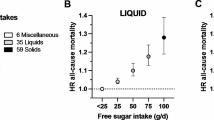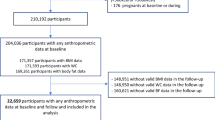Summary
Population-based studies report a beneficial health effect and a lower mortality rate for diets rich in fruits and vegetables. Therefore, the aim of our study was to analyze differences between various forms of diet and health-related variables. The sample for this study was taken from the Austrian Health Interview Survey 2006/07 (N = 15,474). Multivariate analyses of variance adjusted by sex, age, and socioeconomic status (SES) were conducted to examine health-related behavior, health, and quality of life depending on different forms of diet. Additionally, differences in the SES and body mass index (BMI) were analyzed. Our results show that a vegetarian diet is associated with a better health-related behavior, a lower BMI, and a higher SES. Subjects eating a carnivorous diet less rich in meat self-report poorer health, a higher number of chronic conditions, an enhanced vascular risk, as well as lower quality of life. In conclusion, our results have shown that consuming a diet rich in fruits and vegetables is associated with better health and health-related behavior. Therefore, public health programs are needed for reducing the health risks associated with a carnivorous diet.
Zusammenfassung
An Populationen durchgeführte Studien zeigen, dass sich eine Ernährung, die viel Obst und Gemüse beinhaltet, vorteilhaft auf die Gesundheit und die Mortalität auswirkt. Daher war das Ziel unserer Untersuchung, Unterschiede zwischen verschiedenen Ernährungsweisen in gesundheitsrelevanten Variablen zu analysieren. Dazu wurden die Daten der österreichischen Gesundheitsbefragung (AT-HIS 2006/07; N = 15.474) analysiert. Mittels multivariater Varianzanalysen wurden Unterschiede zwischen verschiedenen Ernährungsgewohnheiten im Gesundheitsverhalten, der Gesundheit und Lebensqualität kontrolliert nach dem Geschlecht, Alter und sozioökonomischen Status (SES) berechnet. Zusätzlich wurden Unterschiede im sozioökonomischen Status (SES) und dem Body Mass Index (BMI) analysiert. Unsere Ergebnisse zeigen, dass eine vegetarische Ernährung mit einem besseren Gesundheitsverhalten, einem niedrigeren BMI und höherem SES einhergeht. Personen, die moderat Fleisch essen, haben eine schlechtere subjektive Gesundheit, leiden an mehr chronischen Krankheiten, haben ein höheres vaskuläres Risiko und eine niedrigere Lebensqualität. Zusammenfassend zeigen unsere Ergebnisse, dass der Konsum einer Ernährung mit viel Obst und Gemüse mit einer verbesserten Gesundheit und einem besseren Gesundheitsverhalten einhergeht. Daher sind Gesundheitsförderungsprogramme, die das Gesundheitsrisiko, das mit Fleischkonsum einhergeht, nötig.
Similar content being viewed by others
References
Craig WJ, Mangels AR; American Dietetic Association. Position of the American Dietetic Association: vegetarian diets. J Am Diet Assoc. 2009;109(7):1266–82.
Craig WJ. Nutrition concerns and health effects of vegetarian diets. Nutr Clin Pract. 2010;25(6):613–20.
Deriemaeker P, Alewaeters K, Hebbelinck M, Lefevre J, Philippaerts R, Clarys P. Nutritional status of Flemish vegetarians compared with non-vegetarians: a matched sample study. Nutrients. 2010;2(7):770–80.
American Dietetic Association, Dieticians of Canada. Position of the American Dietetic Association and Dieticians of Canada: vegetarian diets. Can J Diet Pract Res. 2003;64(2):62–81.
Baines S, Powers J, Brown WJ. How does the health and well-being of young Australian vegetarian women compare with non-vegetarians? Public Health Nutr. 2007;10(5):436–42.
Dwyer JT. Health aspects of vegetarian diets. Am J Clin Nutr. 1988;48:712–38.
Farmer B, Larson BT, Fulgoni VL, Rainville AJ, Liepa GU. A vegetarian dietary pattern as a nutrient-dense approach to weight management: an analysis of the national health and nutrition examination survey 1999–2004. J Am Diet Assoc. 2011;111(6):819–27.
Key TJ, Appleby PN, Rosell MS. Health effects of vegetarian and vegan diets. Proc Nutr Soc. 2006;65(1):35–41.
Rizzo NS, Sabaté J, Jaceldo-Siegl K, Fraser GE. Vegetarian dietary patterns are associated with a lower risk of metabolic syndrome: the Adventist health study 2. Diabetes Care. 2011;34(5):1225–7.
Tonstad S, Butler T, Yan R, Fraser GE. Type of vegetarian diet, body weight, and prevalence of type 2 diabetes. Diabetes care. 2009;32(5):791–6.
Pollard J, Greenwood D, Kirk S, Cade J. Lifestyle factors affecting fruit and vegetable consumption in the UK women’s cohort study. Appetite. 2001;37(1):71–9.
Gacek M. Selected lifestyle and health condition indices of adults with varied models of eating. Rocz Pantsw Zakl Hig. 2010;61(1):65–9.
Low Dog T. The role of nutrition in mental health. Altern Ther Health Med. 2010;16(2):42–6.
Appelby PN, Thorogood M, Mann JI, Key TJ. The Oxford vegetarian study: an overview. Am J Clin Nutr. 1999;70:525s–31s.
Craig WJ. Health effects of vegan diets. Am J Clin Nutr. 2009;89(5):1627s–33s.
Key TJ, Appleby PN, Davey GK, Allen NE, Spencer EA, Travis RC. Mortality in British vegetarians: review and preliminary results from EPIC-Oxford. Am J Clin Nutr. 2003;78:533s–8s.
Leitzmann C. Vegetarian diets: what are the advantages? Forum Nutr. 2005;57:147–56.
Appleby PN, Key TJ, Thorogood M, Burr ML, Mann J. Mortality in British vegetarians. Public Health Nutr. 2002;5(1):29–36.
Chang-Claude J, Hermann S, Eilber U, Steindorf K. Lifestyle determinants and mortality in German vegetarians and health-conscious persons: results of a 21-year follow-up. Cancer Epidemiol Biomarkers Prev. 2005;14(4):963–68.
Fraser GE. Vegetarian diets: what do we know of their effects on common chronic diseases? Am J Clin Nutr. 2009;89:1607s–12s.
Singh PN, Sabaté J, Fraser GE. Does low meat intake increase life expectancy in humans? Am J Clin Nutr. 2003;78(3):526s–32s.
Burkert NT, Großschädl F, Muckenhuber J, Rásky È, Stronegger WJ, Freidl W. Gastro-intestinal complaints related to various eating behaviors. J Nutr Therapeutics. 2012;1:19–23.
Austin GL, Adair LS, Galanko JA, Martin CF, Satia JA, Sandler RS. A diet high in fruits and low in meat reduces the risk of colorectal adenomas. J Nutr. 2007;137(4):999–1004.
Flood A, Velie AM, Sinha R, Chaterjee N, Lacey JV, Schairer C, Schatzkin A. Meat, fat, and their subtypes as risk factors for colorectal cancer in a prospective cohort study in women. Am J Epidemiol. 2003;158:59–68.
Mathew A, Peters U, Chatterjee N, Kulldorff M, Sinha R. Fat, fiber, fruits, vegetables, and risk of colorectal adenomas. Int J Cancer. 2004;108:287–92.
McEvoy CT, Temple N, Woodside JV. Vegetarian diets, low-meat diets and health: a review. Public Health Nutr. 2012;15:2287–94.
Seow A, Quah SR, Nyam D, Straughan PT, Chua T, Aw TC. Food groups and the risk of colorectal carcinomas in an Asian population. Cancer. 2002;95:2390–6.
Vang A, Singh PN, Lee JW, Haddad EH, Brinegar CH. Meats, processed meats, obesity, weight gain and occurrence of diabetes among adults: findings from Adventist health studies. Ann Nutr Metab. 2008;52(2):96–104.
Boutron-Ruault MC, Senesse P, Meance S, Belghiti C, Faivre J. Energy intake, body mass index, physical activity, and the colorectal adenoma-carcinoma sequence. Nutr Cancer. 2001;39:50–7.
Sabaté J. The contribution of vegetarian diets to health and disease: a paradigm shift? Am J Clin Nutr. 2003;78:502s–7s.
Sabaté J. The contribution of vegetarian diets to human health. Forum Nutr. 2003;56:218–20.
Karlic H, Schuster D, Varga F, Klindert G, Lapin A, Haslberger A, Handschur M. Vegetarian diet affects genes of oxidative metabolism and collagen synthesis. Ann Nutr Metab. 2008;53(1):29–32.
Kornsteiner M, Singer I, Elmadfa I. Very low n-3 long-chain polyunsaturated fatty acid status in Austrian vegetarians and vegans. Ann Nutr Metab. 2008;52(1):37–47.
Majchrzak D, Singer I, Männer M, Rust P, Genser D, Wagner KH, Elmadfa I. B-vitamin status and concentrations of homocysteine in Austrian omnivores, vegetarians and vegans. Ann Nutr Metab. 2006;50(6):485–91.
Schumacher M, Eber B, Schallmoser K, Toplak H, Zweiker R, Lindschinger M, Sommer K, Klein W. Eating behaviour of patients with metabolic diseases and metabolically healthy probands in Austria. Results of a questionnaire survey at the Graz Autumn Fair 1991. Wien Med Wochenschr. 1993;143(12):329–32.
Klimont J, Kytir J, Leitner B. Austrian Health Interview Survey. (Oesterreichische Gesundheitsbefragung 2006/07. Hauptergebnisse und methodische Dokumentation). Wien: Statistik Austria; 2007.
Craig CL, Marshall A, Sjöström M, Baumann AE, Booth ML, Ainsworth BE, Pratt M, Ekelund U, Yngve A, Sallis JF, Oja P. International physical activity questionnaire: 12 country reliability and validity. Med Sci Sports Exerc. 2003;35(8):1381–95.
World Health Organization. WHOQOL-BREF. Introduction, administration, scoring, and generic version of the assessment. Geneva: WHO; 1996. http://www.who.int/mental_health/media/en/76.pdf. Last access 11 Nov 2013
OECD Social Policy Division. “What are equivalence scales?” 2009. http://www.oecd.org/eco/growth/OECD-Note-EquivalenceScales.pdf. Last access 11 Nov 2013
Brennan SL, Henry MJ, Nicholson GC, Kotowicz MA, Pasco JA. Socioeconomic status, obesity and lifestyle in men: the Geelong Osteoporosis Study. J Mens Health. 2010;7:31–41.
Acknowledgements
None
Conflict of interest
The authors declare no conflict of interest, and no competing financial interests exist.
Author information
Authors and Affiliations
Corresponding author
Rights and permissions
About this article
Cite this article
Burkert, N., Freidl, W., Großschädel, F. et al. Nutrition and health: different forms of diet and their relationship with various health parameters among Austrian adults. Wien Klin Wochenschr 126, 113–118 (2014). https://doi.org/10.1007/s00508-013-0483-3
Received:
Accepted:
Published:
Issue Date:
DOI: https://doi.org/10.1007/s00508-013-0483-3




